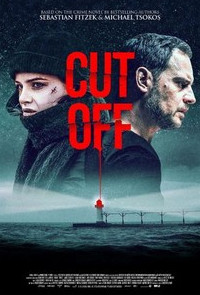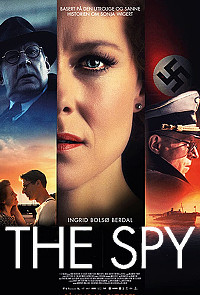| SHADOWS ON THE WALL | REVIEWS | NEWS | FESTIVAL | AWARDS | Q&A | ABOUT | TALKBACK | |||||||||||||||||||||||||||||
 Shadows off the beaten path Shadows off the beaten pathIndies, foreign, docs and shorts...
On this page:
CUT OFF |
THE SPY |
WE ARE LITTLE ZOMBIES
| |||||||||||||||||||||||||||||
| See also: SHADOWS FILM FESTIVAL | Last update 10.Jul.20 | |||||||||||||||||||||||||||||
|
Cut Off Abgeschnitten Review by Rich Cline | 
 Watch it now...
| 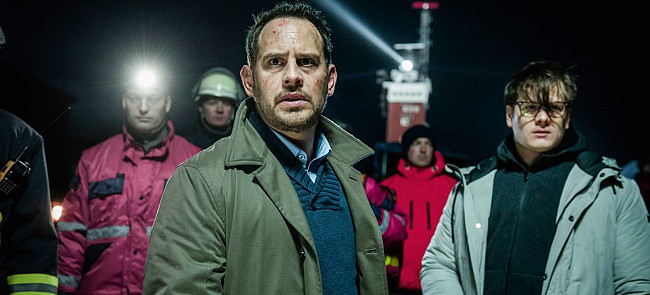 Muscular filmmaking, harsh winter weather and medical-grade grisliness give this German thriller an edge even before the script starts digging into the characters' messy emotional states. The pace is urgent, charging headlong into a convoluted mystery and balancing gruesome events with gallows humour. And the story is a series of clues and increasingly hideous discoveries. It's overstuffed and overlong, but there's barely a moment that isn't thrilling. During an autopsy on a horribly mutilated woman in Berlin, short-tempered forensic pathologist Paul (Bleibtreu) discovers a capsule containing a tiny slip of paper bearing the name and phone number of his estranged teen daughter Hannah (Prakopenka). She's been kidnapped, and the corpse is a warning from the sadistic madman (Eidinger) tormenting her. The next clue connects him to comic-book artist Linda (Bauer), old friend Ender (Yardim) and a body on an isolated Heligoland beach. So as a snowstorm closes in, Paul takes his dim-but-wealthy intern Ingolf (Hesse) and heads north. The hyper-complicated narrative follows both Paul and Lisa, moving so quickly that we don't have time to worry about the convenient twists and nagging holes. What happens is seriously violent, which the screenplay tempers using blackly comical touches. Paul remotely guiding Lisa through an autopsy is both ghastly and amusing. It's also superbly well shot and acted to add to the film's grindingly tense tone. Meanwhile, what's happening to Hannah is horrific, snakily connected to a case Paul botched four years ago. Bleibtreu always has great presence on-camera, and Paul is an unusually complicated man, tormented by his past, angry about his present, impulsive and also of course brilliant. Bleibtreu also finds the emotional resonance as Paul shoves his feelings away. So his tetchy banter with Hesse's superbly awkward Ingolf has a nice kick to it (franchise alert!), as do his frantic phone conversations with Linda, played with steely tenacity by Bauer and easily the most likeable person on-screen. Writer-director Alvart tells this story with considerable skill, cleverly using light, sound and editing to crank up the suspense and make freaky situations downright terrifying. The narrative is a barrage of postmortem examinations, stormy mayhem and brutal nastiness, while the deeper character elements bring it to life, pulling us into the specific fears these people have as they discover their connections to the vile things that are happening. There's so much going on that it's impossible to follow the story's logic, but the way it develops is riveting.
|
| The Spy Spionen Review by Rich Cline | 
Watch it now...
| 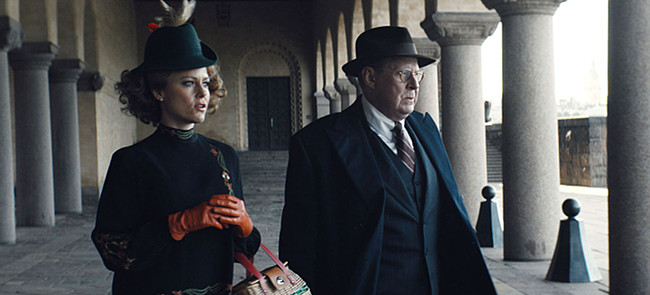 Based on a true story, this slickly produced Norwegian thriller charges through a busy story, quickly introducing a huge number of characters who are difficult to remember. Once it gets going, it's easier to follow the twisty plot, and there's a strong central theme in the depiction of a woman who finds herself in a complex situation that requires a lot more moral strength than she thought she had. In Nazi-occupied Oslo, diva actress Sonja Wigert (Berdal) catches the eye of the German commander Josef (Scheer), and she hopes he'll cast her in a high-profile propaganda film with a beloved director (Andersen). When her father (Hivju) is arrested, she abandons her casual neutrality and agrees to help resistance operative Thorsten (Lassgard) fend off an impending invasion of Sweden. Then on the film set, Josef turns the tables, asking her to spy on the Swedes. And the deeper she goes into this web of espionage, the more she realises that she can't trust anyone. It's a challenge to keep up with the various plot threads, as briefly introduced characters keep turning up later, revealing new hints about whose side they're on. But everything relates to Sonja, which is especially intriguing since she's so deeply self-involved. It takes her a long time to get a grip on the bigger picture. Meanwhile, the film is impeccably designed, with colourful costumes and settings. So even if it's largely dialog-based, it looks gorgeous. Berdal is excellent as a multilingual woman who is unafraid to use everything she has, including her sexual power, to further her career. She thinks the war is irrelevant, so it's fascinating to watch her being nudged into taking sides. Everyone around her is rather dull by comparison, including her lovers, handlers and fellow stage and screen performers. This means that the relationships never spring to life, including her romance with the charming but shifty Hungarian Andor (Chapelle). Director Jonsson makes sure that each scene in the film looks beautiful, showing off the cities, countryside and cast at their glamorous best. But the script is a choppy series of shortish sequences that don't quite flow together into a gripping whole. Since the characters are rather cold, the film thankfully avoids Hollywood bombast, but it's more intriguing than engaging. The sad truth is that Wigert's career was derailed because people thought she was a Nazi collaborator, and her heroism wasn't revealed until decades after her death.
|
| We Are Little Zombies Review by Rich Cline | 
| 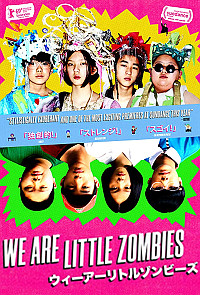 dir-scr Makoto Nagahisa prd Taihei Yamanishi, Haruki Yokoyama, Haruhiko Hasegawa, Shin'ichi Takahashi with Keita Ninomiya, Satoshi Mizuno, Mondo Okumura, Sena Nakajima, Kuranosuke Sasaki, Rinko Kikuchi, Masatoshi Nagase, Go Riju, Youki Kudoh, Masako Yasumoto, Shiro Sano, Jun Murakami release Jpn 14.Jun.19, UK Nov.19 liff, US 10.Jul.20 19/Japan 2h01 SUNDANCE FILM FEST BERLIN FILM FEST Watch it now...
|  Colourful and wildly paced, this Japanese romp assumes a child's eye view as it tackles darkly serious themes with comedy and music. It's the story of four children who grew up emotionally distanced from their mothers and fathers, which creates an unexpected common ground between them. Writer-director-composer Makoto Nagahisa approaches the story and themes with relentless invention. The film is overlong, but exhilarating in its fresh attitude. Four orphaned tweens, three boys and a girl meet on a sunny day at the crematorium, united in their disregard for how they're expected to grieve over the deaths of their parents. Hikari's (Ninomiya) died in a bus crash, Ishi's (Mizuno) were killed in a kitchen fire, Takemura's (Okumura) committed suicide, and Ikuko's (Nakajima) were murdered. Since none of them felt loved, they don't grieve in obvious ways, so they decide to have an adventure, calling themselves zombies because they met at a funeral, then forming a band. And their catchy first song goes viral. The film is narrated in turn by each child with lurid-hued imagery, witty gaming-style photography and computery sound effects. The kids take hilariously childish approaches to huge issues, refreshingly undermining adults who are pushy, cruel and shockingly cold. As their odyssey continues, they have side-quests to accomplish, levels to clear and a mystery to solve. There's also a remarkably bleak false ending that may trick impatient viewers (don't despair!). Frankly, the film's bonkers approach wouldn't work without its emotional depth. "Since no one can help me, there's no point crying," they say. So they cheerfully greet the silence as they return to their now-empty homes, relieved that their parents aren't there. In flashbacks, mothers and fathers appear as complex people who are broken and distracted, covering emptiness with vague words or violence. Each child's story adopts a distinct musical tone. And fame brings new feelings that the quartet must deal with in their own inimitable way. The expansive nature of the narrative, as it traverses 13 stages, allows the film to touch on some very big ideas with observations that are both provocative and resonant. For example, after their neglectful parents, these children are quickly exploited by the music industry for their sad stories and expressive energy. Thankfully, this is depicted with a sharp sense of humour, smart references and bracingly fresh originality. When you're alone, the world's rainbow colours seem to vanish. But the film reminds us that sometimes breaking the rules can offer hope.
| 
See also: SHADOWS FILM FESTIVAL © 2020 by Rich Cline, Shadows
on the Wall
HOME | REVIEWS | NEWS | FESTIVAL | AWARDS
| Q&A | ABOUT | TALKBACK | | |||||||||||||||||||
